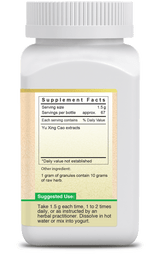Yu Xing Cao - Fish Mint
Yu Xing Cao (Houttuynia cordata), also known as "fish mint," is a traditional Chinese herb known for its antimicrobial, antiviral, and anti-inflammatory properties. In Traditional Chinese Medicine (TCM), it is often used to clear heat and toxins, making it effective in treating respiratory infections, fevers, and inflammatory conditions. The herb is particularly valued for its ability to fight bacterial and viral infections, which has made it a part of various treatments for conditions involving inflammation and infection. In TCM, Yu Xing Cao is commonly used in formulas to treat lung-related issues such as pneumonia, bronchitis, and sinusitis due to its ability to clear damp-heat from the lungs.
When it comes to Lyme disease, Yu Xing Cao has gained attention as a potential supportive treatment due to its antimicrobial properties. Lyme disease, caused by the bacteria Borrelia burgdorferi, often requires long-term management of symptoms, including joint pain, inflammation, and fatigue. Yu Xing Cao’s ability to reduce inflammation and fight infections makes it an attractive option for supporting the immune system and addressing the underlying bacterial infection associated with Lyme disease. While it should not be considered a standalone treatment, it is often used as part of a broader herbal protocol in TCM to help manage symptoms and enhance overall recovery.
History of Yu Xing Cao - Fish Mint
Yu Xing Cao (Houttuynia cordata) has a long history in Traditional Chinese Medicine (TCM) and Asian herbal practices, dating back centuries. Its use can be traced to ancient Chinese medical texts, where it was valued for its ability to clear heat and detoxify the body. Historically, it was primarily used to treat infections, inflammation, and respiratory conditions, particularly in regions where it grew naturally. Known as “fish mint” due to its distinctive smell, Yu Xing Cao is native to Southeast Asia and southern China, where it has been utilized both as a medicinal herb and a culinary ingredient.
In ancient China, Yu Xing Cao was commonly used in regions with humid climates, where damp-heat conditions often led to respiratory and digestive ailments. The herb was traditionally used in decoctions, teas, and poultices to address lung infections, urinary tract infections, and skin conditions. Its use spread to other parts of Asia, including Japan and Vietnam, where it continued to be valued for its broad-spectrum antimicrobial effects. Over time, its applications expanded beyond traditional uses, incorporating modern understandings of its anti-inflammatory and immune-boosting properties, making it a valuable herb in both traditional and contemporary herbal medicine.
Product Description for Yu Xing Cao Powder
Common Name: Fish Mint
Botanical Name: Houttuynia cordata
Channels/Meridians: Lung, Liver, Bladder, Large Intestine
Pin Yin name: Yu Xing Cao
Other Names: H. Cordata, Fishy Smelling Herb, Dokudami, Heart Leaf, Houttuynia
Other Ingredients: None, nothing has been added.
Package Size: One Pound (1lb)
Form: Powder
Origin: China
Brand: Nuherbs Lab Tested
Cautions: Do not use if pregnant or nursing.
Herb Components
1. Decanoylacetaldehyde
2. Myrcene
3. α- Pinene
4. d-Limonene
5. 2-Methyheptenone
6. Camphene
7. Bornyl acetate
8. Linalool
9. Caryophyllene
Additional Information on Fishy Smelling Herb
- Clears Lung Heat
- Removes Toxicity
- Dissolves Phlegm
- Benefits Immune System
- The literal translation of Yu Xing Cao is "fishy-smelling herb". Fresh cut stems have a strong odor, but the smell disappears when dried. Houttuynia has been used in Traditional Chinese Medicine to clear heat and toxins.
Product Properties: Pungent, Cold
Common Questions:
Does this plant smell like fish?
Yu Xing Cao (Houttuynia cordata) is known for its distinctive and strong smell, which is often described as fishy or similar to the scent of fish or fish oil. This pungent odor is why the plant is commonly referred to as "fish mint." While the aroma can be off-putting to some, it is a characteristic feature of the herb, particularly in its fresh form. The smell tends to be less noticeable when the herb is dried and used in medicinal preparations, but in its raw state, the fishy scent is quite prominent.
Are there any side effects or precautions when using Yu Xing Cao?
While Yu Xing Cao is generally considered safe when used appropriately, some people may experience allergic reactions or digestive discomfort, particularly when consumed in large amounts. As with any herbal remedy, it is important to consult with a healthcare provider or TCM practitioner before using Yu Xing Cao, especially for long-term use or if you have underlying health conditions.
References:
https://www.phoenixmedical.com/yu-xing-cao
https://www.americandragon.com/Individualherbsupdate/YuXingCao.html
https://tcmwiki.com/wiki/yu-xing-cao
https://www.researchgate.net/figure/Commercial-TCM-products-A-Houttuynia-cordata-Yu-xing-cao-yuxingcao-B-Radix-Dioscoreae_fig3_332837827 
Check out our How to Use Bulk Herbs page to see how to use herbs correctly. Our web page is constantly expanding, as of today we have articles on:
- How to make salves, poultice, tinctures, teas, capsules, gargles, and foot bathes
- How to make a citrus facial splash
- Cayenne pepper: Caterpillar and aphid spray ( Natural insect repellent )
- Citrus potpourri basket
Nuherbs
Each batch of herbs is dual-lab tested by in-house lab and independent third party lab. In-house lab is equipped with instruments such as a high performance liquid chromatograph, moisture determination meter, Fourier transform infrared spectrometer, atomic absorption spectrophotometer, gas chromatograph, etc.
In addition, the following additional tests are performed:
- Microbacteria
- Pesticides - over 200 pesticides tested for (Uab 2000 screen)
- Heavy Metals - Lead, Mercury and Arsenic
























